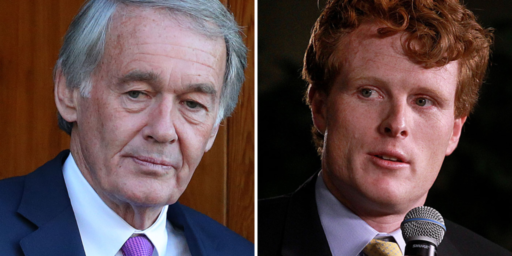NOT A DIME’S WORTH OF DIFFERENCE
Reason’s Tim Cavanaugh is having trouble telling the Democrats and Republicans apart these days.
They continue to look and sound like, respectively, conservatives and liberals; but no voter can escape the conclusion that the evil party and the stupid party have decided to switch roles.
Exhibit A is Senator Edward Kennedy (D-Mass.), last seen dragging his superannuated bulk onto the Senate floor to filibuster against a massive expansion of Medicare drug benefits, the sort of bill Kennedy has spent his entire career trying to promote. “I’m going to fight this bill with everything I’ve got,” the crapulous lawmaker vowed. “The more senior citizens learn…the more they oppose it.” Kennedy, a senior himself, has of course learned the most damning fact of all about this bill: that it is widely supported by the Republicans and by President Bush.
***
Such a free-spending approach to your tax dollars might have seemed the height of un-Republican behavior a few short years ago. But that was before the tragic events of September 11, 2001 convinced GOP lawmakers that without an $11 billion expansion of the No Child Left Behind program, tariffs to protect domestic steel and textile industries, and cotton and corn subsidies as high as an elephant’s eye, the terrorists would surely win. A new report from the Heritage Foundation reveals just how much GOP control of the executive and legislative branches has expanded Washington spending on a host of programs.
Briefly, the report by Brian M. Riedl reveals that Republicans have managed to increase spending to a level of $20,000 per household, the highest it’s been since World War II. Federal spending has increased by $296 billion in the last two years; only 45 percent of that spending has been related to the war on terror–quite an achievement considering that the GOP already gives itself enormous latitude in defining war-related spending. The remaining 55 percent has been taken up with such traditional GOP faves as unemployment (up 85 percent since 2001), education (up 65 percent) and general government costs (up 63 percent, largely thanks to federal bailouts of state governments).
The irony, of course, is that this is almost always the case. In practical terms, both parties are moderate, catch-all parties. The definition of “moderate” is a moving target, shaped by both political leaders and voters.
During much of the 1990s, the DLC Democrats, led by Bill Clinton, pushed the party to the right. With the exception of the gays in the military hubbub, most of the policies enacted under Clinton could have been plausibly done by Bush 41 or Bob Dole. By and large, Republican animus was directed at Clinton the man, not the man’s policies.
Similarly, the Republicans began a move to the left with the nomination of George W. Bush, who ran as a “compassionate conservative.” The very label suggested that Reagan-style conservatism was a bit too brutal and that it needed a bit of softening. Indeed, Bush 41 talked about building a “kinder, gentler nation” in his convention speech back in 1988.
What separates the two parties–and makes those of us who passionately follow politics really care–is at the margins. Judicial nominees. Whether tax cuts should be across the board or targeted. Whether a huge prescription drug entitlement for the elderly should come with or without some minor privatization. Whether gay marriage will be legal in five or ten years. Whether military interventions into Third World trouble spots should be entirely humanitarian or also involve US national interests. These things are important in the grand scheme of things. But the bulk of governance is still a football game played between the 40 yard lines. This is quite frustrating for those of us who are ideologues, but almost certainly necessary in a federal Republic such as ours with its infinite diversity and representation based on tiny geographical subsets of the nation.




